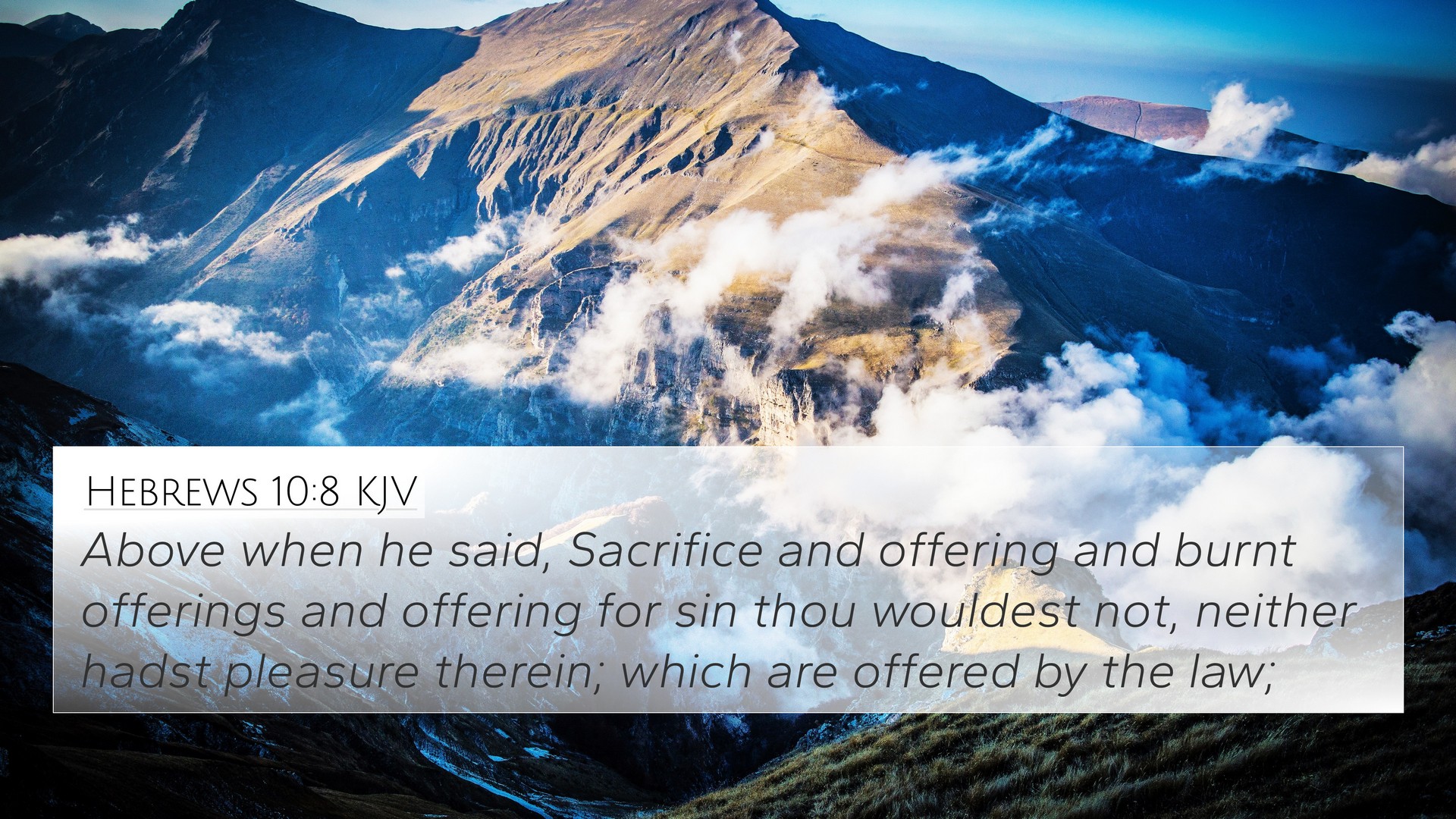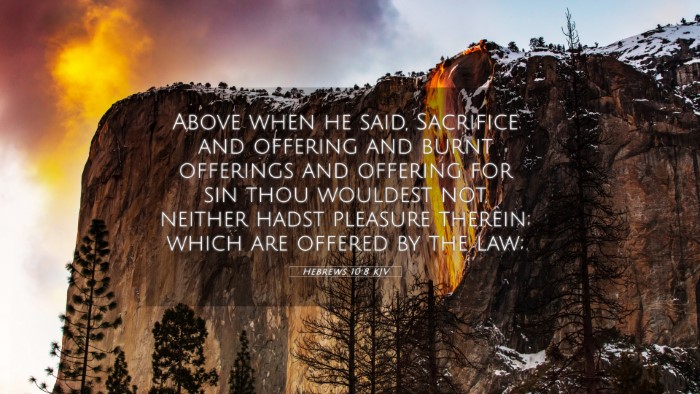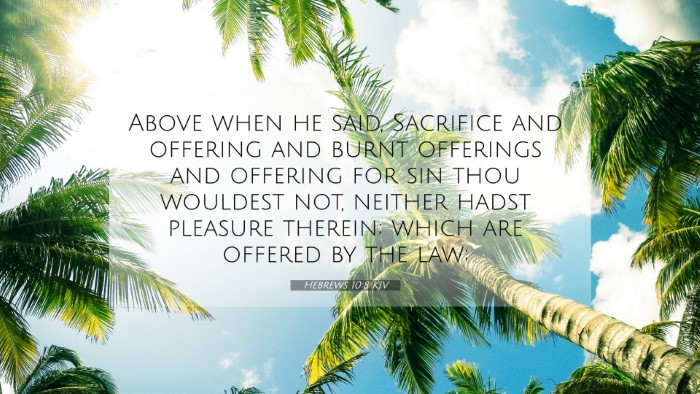Summary of Hebrews 10:8
Verse: "Above when he said, Sacrifice and offering and burnt offerings and offering for sin thou wouldest not, neither hadst pleasure therein; which are offered by the law."
Meaning and Interpretation
The verse Hebrews 10:8 addresses the inadequacy of the Old Testament sacrificial system in fulfilling God's ultimate redemptive purpose. This passage describes that the sacrifices, while prescribed by the Law, are not what God desires for true worship and reconciliation. The underlying message emphasizes God's preference for obedience and a contrite heart over ritualistic offerings. Below are the insights based on public domain commentaries:
-
Matthew Henry Commentary:
Henry emphasizes that the sacrificial system was a shadow of better things to come (referring to the sacrifice of Christ). These outward rituals could never satisfy God's demands or truly atone for sin. He explains that God was never pleased with the mere actions of sacrifice when the heart was not engaged in true devotion and holiness.
-
Albert Barnes Commentary:
Barnes elaborates on the term "sacrifices," indicating that this refers primarily to the Levitical sacrifices. He notes that the repetition of sacrifices under the Law illustrates their ineffectiveness in dealing with sin permanently. Barnes points out that this verse prepares the reader for the discussion of Christ’s unique and sufficient sacrifice as the culmination of God’s redemptive plan.
-
Adam Clarke Commentary:
Clarke critiques the restrictions imposed by the Law concerning sacrifices, highlighting that God desires a relationship rather than mere compliance. He argues that sacrifices were necessary, but they pointed to a greater reality fulfilled in Christ. Clarke draws attention to God's lack of delight in mere ritualism, reaffirming that true worship must spring from the heart.
Connections to Other Scripture
The theme of Hebrews 10:8 connects with various other scriptures that elaborate on the nature of sacrifice, worship, and God's desires:
- Psalm 51:16-17: "For thou desirest not sacrifice; else would I give it: thou delightest not in burnt offering. The sacrifices of God are a broken spirit: a broken and a contrite heart, O God, thou wilt not despise." This passage emphasizes the need for genuine repentance over mere ritualistic sacrifice.
- Isaiah 1:11-13: "To what purpose is the multitude of your sacrifices unto me? saith the LORD: I am full of the burnt offerings of rams, and the fat of fed beasts; and I delight not in the blood of bullocks, or of lambs, or of he-goats." Here, God expresses His dissatisfaction with meaningless ritual practices.
- Micah 6:6-8: "Wherewith shall I come before the LORD, and bow myself before the high God?... He hath showed thee, O man, what is good; and what doth the LORD require of thee, but to do justly, and to love mercy, and to walk humbly with thy God?" This verse underscores that God seeks moral integrity and humility over sacrificial offerings.
- Matthew 9:13: "But go ye and learn what that meaneth: I will have mercy, and not sacrifice: for I am not come to call the righteous, but sinners to repentance." Jesus reiterates God's priority of mercy over mere sacrificial practices.
- Romans 12:1: "I beseech you therefore, brethren, by the mercies of God, that ye present your bodies a living sacrifice, holy, acceptable unto God, which is your reasonable service." Paul encourages believers to offer themselves in true worship, fulfilling what the Law foreshadowed.
- Hebrews 10:5: "Wherefore when he cometh into the world, he saith, Sacrifice and offering thou wouldest not, but a body hast thou prepared me." This introduces the theme of Christ’s incarnation and ultimate sacrifice being necessary for atonement.
- Hebrews 9:9-10: "Which was a figure for the time then present, in which were offered both gifts and sacrifices, that could not make him that did the service perfect, as pertaining to the conscience; which stood only in meats and drinks, and divers washings, and carnal ordinances..." This highlights the limitations of the sacrificial system.
- 1 Samuel 15:22: "And Samuel said, Hath the LORD as great delight in burnt offerings and sacrifices, as in obeying the voice of the LORD? Behold, to obey is better than sacrifice, and to hearken than the fat of rams." This reinforces the principle that obedience to God takes precedence over ritual sacrifice.
Application of Cross-Referencing
Cross-referencing Bible texts can enrich understanding and interpretation. The following tools and methods can aid in deepening one's scriptural study:
- Utilize a Bible concordance to find relevant verses related to particular themes, such as the nature of sacrifice.
- Employ a Bible cross-reference guide to explore thematic connections between the Old and New Testaments.
- Practice cross-reference Bible study by linking passages dealing with sacrifice, faith, and obedience.
- Investigate how to use Bible cross-references effectively for deeper theological study and sermon preparation.
- Engage in comprehensive Bible cross-reference materials to understand the interwoven narratives throughout scripture.
Conclusion
Hebrews 10:8 serves as a significant reminder of God's ultimate desire for heartfelt worship rather than mere compliance with religious rituals. The various scriptural cross-references support and deepen the comprehension of this theme, inviting believers to explore the profound connections between the two Testaments. By utilizing effective tools and methods of cross-referencing, one can uncover the rich tapestry of scripture that showcases God's redemptive love and purpose.




